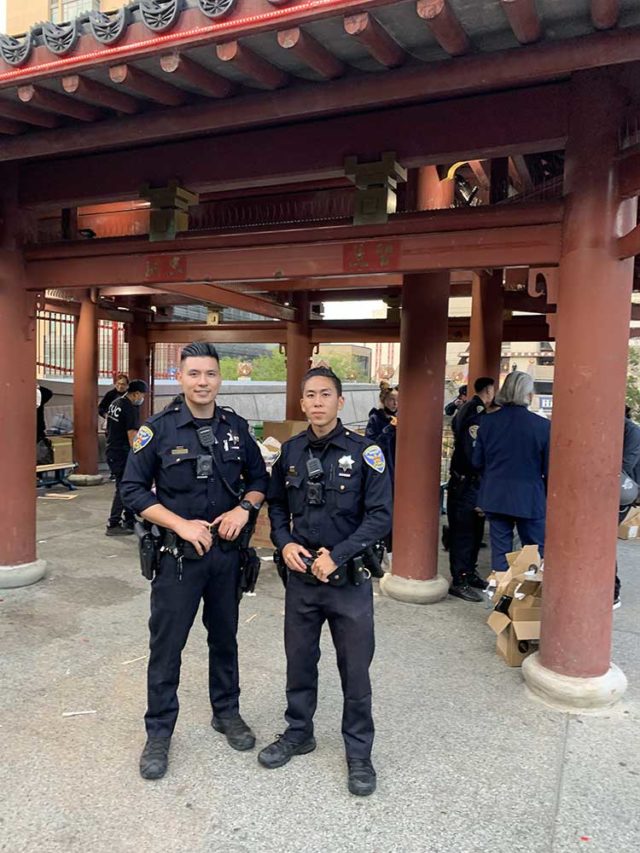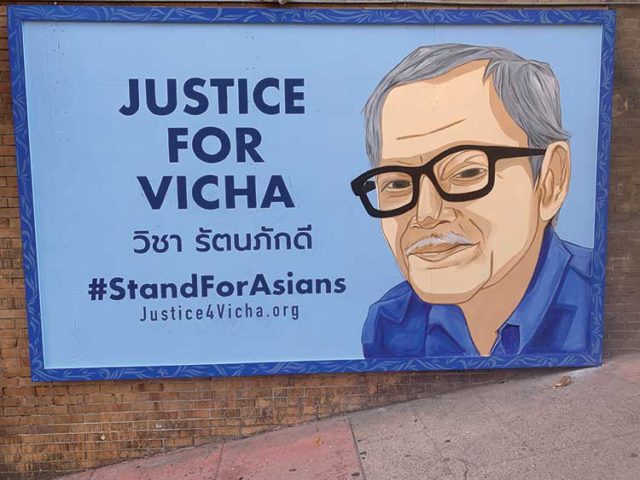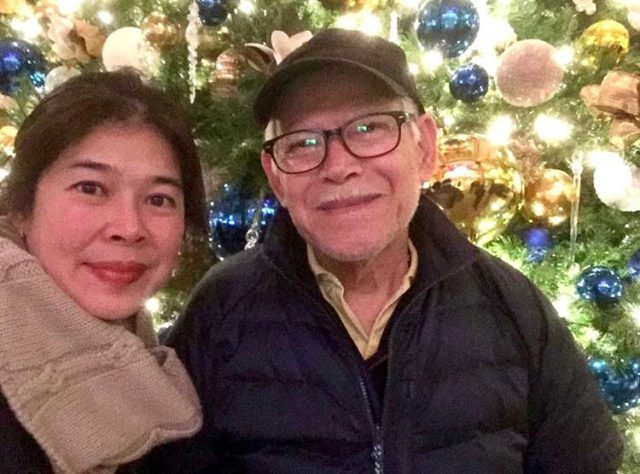Vicha Ratanapakdee, an 84-year old immigrant from Thailand, was preparing to go on his early morning walk in the quiet Anza Vista neighborhood of San Francisco on Saturday, January 28, 2021. The Thai grandfather had just survived his heart surgery 9 months before, and his doctor told him to walk daily for his exercise. It was around 8:28 a.m. when Ratanapakdee, a short and thin man and nearly blind, suddenly got shoved hard into the sidewalk by 19-year old Antoine Watson. Watson was sitting in his BMW with his girlfriend; when he saw Ratanapakdee, he got out of his car, ran fast across the street and violently attacked the elderly Thai man.
Film footage of the vicious attack, shown on ABC 7, KPIX, and other TV stations, shows Ratanapakdee hit the sidewalk pavement hard, his head jerk upward after hitting the pavement, and his head and body slide into a garage door. Another video shows that after the attack, Watson jerked both his arms hard as if he felt thrilled with attacking the elderly Thai man, according to Eric Lawson, Ratanapakdee’s son-in-law. “He acted like somebody who had just made a big play sacking the quarterback in the Super Bowl,” Lawson said.
According to Lawson and Monthanus Ratanapakdee, the Thai man’s older daughter, the video shows Watson return to his BMW, enter it, get out of his car again, run across the street back to where Ratanapakdee’s body lay, and take pictures of his body before going back to his car.
Ratanapakdee never woke up after the attack, and died a couple days later from bleeding in his brain.
THE IMPACT
“At the hospital, a neurologist told us that even if my father were to survive, he would no longer have any normal functions.” Monthanus Ratanapakdee said.
She and her family bear unspeakable grief from the killing of her father.
Her husband Eric Lawson said, “When Antoine Watson pushed my father-in-law hard into the sidewalk and killed him, he showed no humanity at all. His killing of our father was just like Derek Chauvin putting his knee on George Floyd’s neck to kill him.”
“There are no words to describe how our family feels (about) this overwhelming loss,” Monthanus Ratanapakdee said. “Our father going out for his morning walk after his daily routine of preparing his young grandsons for their day and after just surviving his recent heart surgery. . . and he [is] never coming back to our family again.
“It is so painful for our young sons to lose their beloved grandfather. Their grandpa was such an immense and important part of their daily life. Facing this terrible loss and how this happened will be forever now in the minds and eyes of our children. They always ask about their grandfather and what happened to him.
“My mother is suffering so much. She speaks to him holding his picture, while praying. She suffers deeply from losing my father. It has also affected her health,” she said. “I miss my father very deeply. My father is my everything, my closest confidante. He is the stable and calming presence for our family. He goes to museums and parks with us, and loves going on walks together as a family. If I have something on my mind, I can ask him for advice, such as advice on kids and raising them well for their future.”
She and her husband both said, “Our father kept the balance on everything for our family.”
They and their children scattered Grandpa Vicha’s ashes in the Pacific Ocean near the Golden Gate Bridge. The funeral for Grandpa Vicha was conducted by Thai monks at a Buddhist temple.
The family said it wanted to thank SFPD and the police officers who helped them. They said the officers were kind and compassionate, keeping the family well–informed, asking if they needed anything to let them know. They brought flowers. They attended the funeral. They said the officers helped the family in every way possible.
They also want to thank the doctors at San Francisco General Hospital who did everything they could to save their father’s life.

THE ARREST
SFPD arrested Antoine Watson and his girlfriend, Malaysia Goo, 20, in Daly City, where they lived with Watson’s family. On the day of the attack, Goo had waited in Watson’s BMW when he carried out the attack against Ratanapakdee.
SFPD arrested Watson for felony elder abuse causing great bodily injury, assault with a deadly weapon, and murder. Goo was arrested for accessory after the fact.
Watson pled “not guilty” to the charges. His lawyer, Sliman Nawabi, a deputy public defender, said, “He is not guilty. He is just a 19-year old teenager.”
Chesa Boudin, the San Francisco district attorney, told The New York Times that Watson’s attack on Vicha Ratanapakdee was “a sort of temper tantrum.”
Boudin dropped the charge against Goo, and released her.
JUSTICE FOR VICHA RATANAPAKDEE
Catherine Poshepny, a friend of Monthanus Ratanapakdee, stated, “The day I heard that her dad got attacked, I was just so shocked and in disbelief how this could happen to the nicest and kindest man. I want to see the justice for Grandpa Vicha and help Amy fight until we get this murderer convicted.”
Ruby Tsang, an educator, is a neighbor of Vicha Ratanapakdee’s family. “He was killed across the street from my house,” she said.”He could have been my father. I grieved for him as if he were. I walk my dog daily and see the memorial flowers by the garage he was savagely killed at. As I walk by, I always pray he’s in a better place. I apologize that he was a victim of an unprovoked, senseless murder. Shameful.”
Tsang said she has gone to “all six rallies at the Hall of Justice at 850 Bryant Street, scheduled on the court hearing dates for Watson. The most recent one was August 4. I and others go to the rallies to demand justice for Grandpa Vicha and his family. I have spoken at them. The next one is November 10. Why do I keep going? I go to support Grandpa Vicha and his family. I go to show my posters, “JUSTICE4VICHA” and “StopHateCrimesAgainstAsians,” so the AAPI community can stand up, speak up, and voice our outrage. I go because Victims Lives Matter and I want justice for Vicha Ratanapakdee. Enough is enough!”
A businesswoman, who requested that her name not be revealed to protect her employees, stated, “When I arrived in San Francisco in 1972, I was in complete awe of the most beautiful place on earth. I decided that this was the paradise that I had been looking for. I absolutely loved this city until now.
“Our current district attorney has been spearheading an experiment to deal with criminal activity . . . that has become a total failure. It has vastly increased criminal activity even to the point of murder. It has come to the point where I have extra locks on my garage door and I am afraid to walk around the city by myself. As an older female, I could not fight off an attacker and neither could the 84-year old Thai immigrant who was murdered early this year.”
Will Lee, an entrepreneur, stated, “It really hurts to see a city that I grew up in and love, not love you back. With each violent attack on our Asian community, I’m constantly reminded my own country does not want us here and I will never be ‘American’ enough. It’s a sad reality. It is not only enough for my people to speak up, it’s essential for non-Asian allies to speak and stand with us, if we truly want to celebrate diversity.”
Diana Vuong, director of the Southeast Asian Community Center, said, “It was horrible to witness [through security video] the passing of Grandfather Vicha Ratanapakdee. No, it is not the normal passing. It was murder. It was racial hatred. Grandfather Vicha was standing peacefully, near his home, and unprovoked, a young guy, completely unknown to him suddenly rushed to push him violently down the sidewalk. His head hit the sidewalk very hard . . . The young guy fled, did not take anything from Grandfather Vicha. This incident was followed almost daily by anti-Asian crimes, all were violent with some stabbings, or even killings, in San Francisco.”
Such attacks are hurting the community, said Judy Young, Director of Southeast Asian Development Center. “The Southeast Asian community is small here and has limited access to community resources due to significant barriers such as limited English proficiency, and attacks like these create an environment of fear and further pushes our community into isolation, away from critical services and community connections. However, we must come together as a citywide community to call on increased investments for in-language supportive victim services, more support for communities of color, especially those impacted by poverty and inequality, and through promotion of cross-community education and healing.”
“When I first saw the shocking camera footage of the totally unprovoked assault of the elderly Mr. Vicha Ratanapakdee, like tens of thousands of viewers, I prayed that his injuries were not severe,” said Marlene Trân, an ESL teacher.“Unfortunately, this kindly grandfather succumbed to his injuries and his death completely devastated his close–knit family, friends and his community. With the recent and disturbing increase in anti-Asian hate crimes, it is even more important now to stop these totally unprovoked assaults that mostly became visible because of video footage. This is why I have been a strong advocate of surveillance cameras that would be especially helpful in police investigations.
“Given the documentations, our citizens would expect the DA to be actively prosecuting and to make the perpetrators accountable. If police make arrests, the DA should vigorously follow through with their legal duties. This has not been the case.”
Steven Lee, a volunteer on safety patrols in Chinatown, said, “The murderous attack on Grandpa Vicha Ratanapakdee is especially grievous, not only because of its wonton viciousness but because of the outrageous racist trivializing of the crime by our ideologically crippled district attorney. It is a foreboding of building momentum of anti-Asian hate, attacks, harassment that’s going viral across the country.”
Charlene Yip, a community activist, said as someone who was born and raised in San Francisco, “I really want everyone that also [was born here], they need to realize the anti-Asian attacks in our city is not someone else’s problem. Take responsibility and do something about it. No effort is too small. Vote, volunteer, get involved if you love San Francisco and want to see change.”

GRANDPA VICHA MURAL
A large mural to honor the memory of Grandpa Vicha Ratanapakdee was dedicated on August 29 near Chinatown. Designed by Sarah Siskin and Thitiwat Phromratanapongse, the mural is on Grant Street near California Street, by the California cable car line. It shows a large image of Vicha Ratanapakdee, the large inscription “Justice for Vicha,” and next to it, the Thai words for the call, and #StandForAsians, and Justice4Vicha.org.
Pheephakorn Niamyai, consul at the Thai Consulate in Los Angeles, stated, “The mural, ‘Justice for Vicha,’ represents not only a fond memorial of Grandpa Vicha, who was a victim of a senseless violent attack earlier this year and later passed away from his injuries, but also a symbol of increasing awareness against all kinds of violent crimes to Asian American people. This violent crime against Grandpa Vicha and other violent crimes have a profound impact not only on Asian Americans, but also the American communities as a whole. It is something that should never have happened. I hope this event will help raise awareness of such violent crimes to our society and will encourage AAPI communities to stand up against such crimes, and to report such violent crimes and other crimes to law enforcement agencies.”
Will Lee said, “There are mixed emotions for Grandpa Vicha’s memorial mural. Today did not need to happen, but it took his tragedy to galvanize and bring a community together. His unnecessary passing, and ones before, solidified our strength and voice. It warms my heart to see countless people join in unity for humanity. May you rest in peace, Grandpa Vicha. We will continue to fight for justice for you.”
District 2 Supervisor Catherine Stefani introduced a resolution over the summer to rename a street in Vicha Ratanapakdee’s neighborhood where he was killed, from Sonora Way to Vicha Ratanapakdee Way.
Stefani strongly condemned his killing and the other anti-Asian crimes in San Francisco. “This horrific attack against Grandpa Vicha Ratanapakdee was one of numerous senseless attacks against members of the AAPI community here in San Francisco — our friends and neighbors should not have to fear the unthinkable when they walk on our streets.”
Mayor London Breed also spoke, followed by Matt Haney, a member of the Board of Supervisors.
The San Francisco Board of Supervisors, which passes all kinds of proclamations and resolutions covering many issues, has failed to address the killing of Vicha Ratanapakdee and the perpetration of anti-Asian crimes in San Francisco with any formal proclamation to condemn both. The Board, elected to represent the people of San Francisco, still has the opportunity to strongly condemn Grandpa Vicha Ratanapakdee’s killing and the anti-Asian crimes and hate crimes that continue in San Francisco. Chinese Americans, Vietnamese Americans, Filipino Americans, and other Asian Americans comprise more than 34 percent of the population in San Francisco.
Legislation at the state capitol to address anti-Asian crimes is critical. California has the highest AAPI population in the United States, at 17 percent.
CHINATOWN AND LITTLE ITALY
In San Francisco, Chinatown and Little Italy in North Beach are next to each other. Maurizio Florese, owner of Mona Lisa Restaurant in North Beach, said he respects his neighbors in Chinatown. He stated, “The Italians and the Asian community working together and enjoying the life and everyone is the same and everyone works for their family. The Chinese, most are immigrants, like the Italians. My grandparents came from Calabrese, Italy, and settled in New York City. My grandparents and parents worked hard. Saved money. Took care of family. Lived for family. Italians got along with the Chinese, the Blacks, the whites, everybody.
“Work hard, save money, achievement, family, enjoy life, respect each other. You don’t harm anybody. Teaching these values when the child is very young is very important.
“It’s horrible to see when perpetrators attack the elderly. I witnessed a guy attack an elderly Chinese woman in her 80s. A customer called the police, who arrived, but the attacker fled the scene. Another time, a guy attacked a Chinese female nurse, punching her hard in the stomach.
“Seven months ago, my son was attacked. A guy hit him with a heavy bottle over his head and neck. We called 911. Police arrested him. My son was transported to the hospital. I haven’t heard what happened to the guy who attacked my son. Nobody has called me to tell me. Nothing.
“Criminals need to be prosecuted. We are beyond sick of the crimes in San Francisco. We don’t feel safe in San Francisco.”
ADDRESSING ANTI-ASIAN CRIMES AND HATE CRIMES
Deep concern regarding anti-Asian crimes and hate crimes in San Francisco is widespread, not just among Asian Americans but also among non-Asian Americans in San Francisco. “Across the city, San Franciscans do not feel safe in our neighborhoods, on our streets, and, for too many, not even in our homes.,” said Andrea Shorter, a community activist. “By failing repeatedly to hold dangerous repeat offenders accountable, Chesa Boudin makes clear his disinterest in and inability for keeping our families, our elders, and our communities safe.”
Paulina Fayer, who has lived in San Francisco for 30 years, said, “District Attorney Chesa Boudin is an injustice to justice. He has set back victim justice, criminal justice, and the fusion of the two, restorative justice. Reform isn’t shamelessly excusing a cold-blooded murder as a ‘temper tantrum,’ as Boudin did after 84-year-old Grandpa Vicha suffered fatal injuries at the hands of a violent man decades younger. Unlike the offenders he coddles, Boudin will be held accountable.”
CONCLUSION
There have been many anti-Asian crimes in San Francisco. Violent crimes, hate crimes, assaults, stabbings, killings, and murders of Asian Americans in San Francisco.
In San Francisco, the district attorney and the district attorney’s office have not tried a single case of anti-Asian crimes.
We are at a critical juncture.
The Asian American and Pacific Islander (AAPI) community in San Francisco and the Bay Area has called on California Attorney General Robert Bonto and the California Department of Justice, and U.S. Attorney General Merrick Garland and the U.S. Department of Justice to address this problem.
The AAPI communities in San Francisco and throughout California and the United States are standing united and strong to confront this problem.
Anthropologist Margaret Mead stated, “Never doubt that a small group of thoughtful, committed citizens can change the world; indeed, it is the only thing that ever has.”
Or, in the words of Wilson Chu, a prominent Chinese American attorney and Asian American leader, “We must be willing to fight for equal treatment under the law. We must educate, encourage, and empower AAPI communities across this country. We can, we should, and we must stand up together.”
Anh Lê is an independent journalist. Feedback: [email protected].





